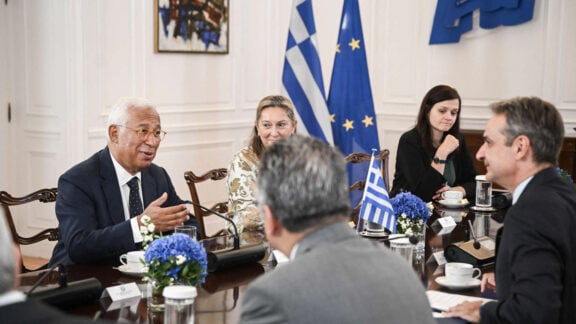It was reported in The National, a Scottish daily newspaper,that an estate is facing questions about some ancient marble artefacts taken from Greece by Scottish aristocrat Thomas Bruce, the Earl of Elgin, which is in the family’s private collection. His descendant, 99-year-old Andrew Bruce, the 11th Earl of Elgin, now owns the collection.
The once known as the Elgin Marbles, eponymously named after Earl Elgin, however, recast as the Parthenon Marbles, or Sculptures, are the point of cultural conflagration between the British and Greeks.
According to Fredericainfoupdates, blog, a sarcophagus described as “one of the very few examples of an Attic sarcophagus from Athens with an inscription” and which “does not appear in any of the modern standard corpora of ancient sarcophagi” – was in Bruce’s private collection at Broomhall House in Fife.

Greek treasures feature as Broomhall home decor
Michael Russell, from the Scottish National Party (SNP) and former cabinet secretary for education, who recently visited Broomhall, pointed to “things that have been taken and put into the walls.
“It’s a bit strange; this Greek sculpture in the entrance hall is part of the decoration.”
Russell said “at least” should be a conversation about the Broomhall artefacts but said that he was “not criticising the Earl personally.”
“The whole thing is untenable. If you have items of immense value to a civilisation and history, storing them elsewhere is untenable.”

Bruce invited experts from the University of Manchester to examine the artefacts in 2019. They reported that Broomhall in Fife, the seat of the Earls of Elgin since the early 18th century, “is home to a small but diverse collection of antiquities, including Greek inscriptions, uninscribed Greek sculpture and architectural fragments.”
Referring to the sarcophagus, they said that an 1816 drawing shows Elgin’s collection in the Duke of Devonshire’s shed at Burlington House. There is the sarcophagus “sitting next to parts of the Parthenon frieze. It is unclear why this object was not included in the sale to the British Museum.”
The sculptures Elgin took from the Parthenon, built in the fifth century BC, were sold to the British Museum in 1816. Greece was then occupied by Ottoman Turks and Elgin claimed to have received a firman (edict) from the Ottomans giving legal consent to take the marbles.
The Greeks have been calling for their return to Greece since their independence in the 1820s; however, since the 1980s, it has become a hot-button issue between Greece and Britain. Recently, there has been some compromise, and even the former conservative chancellor of the excelsior and head of the British Museum, George Osborne, has talked of “sharing” the Greek treasures with Athens.
Sunak has “lost his marbles”
However, last week, the British Prime Minister, Rishi Sunak, did the unimaginable and cancelled a meeting with the Greek Prime Minister Kyriakos Mistotakis over the Parthenon Marbles.
Mitsotakis was in London to meet Sunak, but after Mitsotakis raised the issue of the Parthenon Sculptures on the BBC the British PM cancelled the meeting.
What increasingly looks like a miscalculated attempt by Sunak to appease the right of the Tories, has backfired forcing the PM to escalate the issue, ensuring it colonises international headlines for all the wrong reasons.
In a fiery Prime Minister Question, the Labour opposition Leader Sir Keir Starmer said: “Never mind the British Museum; it’s the prime minister who has obviously lost his marbles.”
Scottish National Party leader Stephen Flynn said: “This should not be subject to negotiations. The Elgin Marbles were stolen and should be returned. Simply.”

Asked whether there were plans to consider repatriating the marble artefacts to Greece, a spokesman for Broomhall said:
“The Bruce family, like many other museums and collections, has artefacts and archives of historical significance regularly available to the family. “The purpose of academic study by scientists and researchers.”









